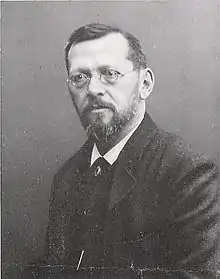Theodor Barth
Theodor Barth (16 July 1849, Duderstadt – 3 June 1909, Baden-Baden) was a German liberal politician and publicist.[1] He was a member of the Reichstag between 1881 and 1884, between 1885 and 1898, and between 1901 and 1903.[2]
Theodor Barth | |
|---|---|
 | |
| Reichstag | |
| In office 1881–1903 | |
| Personal details | |
| Born | 16 July 1849 Duderstadt |
| Died | 3 June 1909 (aged 59) Baden-Baden |
| Political party | National Liberal Party Liberal Union German Free-minded Party Free-minded Union Democratic Union |
| Spouse | Henriette Dreyer (⚭ 1880) |
| Children | 2 sons, 3 daughters |
| Occupation | Politician, Publicist |
Career
Barth started his political career with the National Liberal Party. He soon rejected the Manchesterism of the old liberals, though, and claimed that liberalism needed a social programme. To that end, he sought the cooperation of the Social Democrats,[2] and at multiple times voted against his own party. In the German Freeminded Party (Freisinnige Partei), founded in 1884, Barth would soon find himself opposed to the leadership of Eugen Richter. When the Freeminded Party split in 1893, Barth became a member of the Freeminded Union (Freisinnigen Vereinigung), instead of the Freeminded People's Party of Richter. In 1903, Friedrich Naumann would join the Freeminded Union as well. Barth however would found the Democratic Union[2] (Demokratische Vereinigung) in 1908, together with Rudolf Breitscheid and Hellmut von Gerlach, after the Freeminded Union's participation in the Bülow-Block coalition in the 1907 elections.
Barth founded the liberal weekly Die Nation (The Nation) in 1883[2] and remained as editor until his death in 1909.[3]
See also
References
- "Dr. Barth Wants "International …"". The New York Times. 3 January 1909. Retrieved 12 March 2010.
- "A Friend of England, Dr. Barth". Evening Post. 24 July 1909. Retrieved 12 March 2010.
- "New York Times obituary" (PDF). The New York Times. 4 June 1909. Retrieved 12 March 2010.